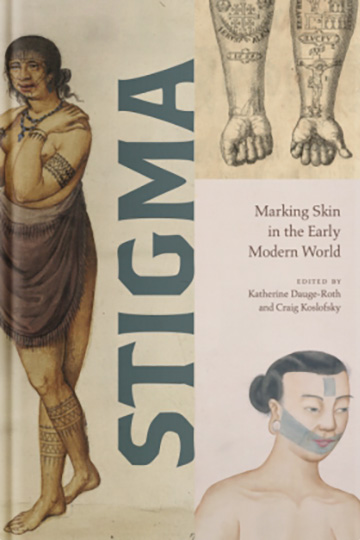
- Publisher: The Pennsylvania State University Press
- Available in: Hardcover, Paperback
- ISBN: 978-0-271-09443-4
- Published: March 14, 2023
Edited by Katherine Dauge-Roth and Craig Koslofsky
The early modern period opened a new era in the history of dermal marking. Intensifying global travel and trade, especially the slave trade, bought diverse skin-marking practices into contact as never before. Stigma examines the distinctive skin cultures and marking methods of Asia, Europe, Africa, and the Americas as they began to circulate and reshape one another in the early modern world.
By highlighting the interwoven histories of tattooing, branding, stigmata, baptismal and beauty marks, wounds and scars, this volume shows that early modern markers of skin and readers of marked skin did not think about different kinds of cutaneous signs as separate from each other. On the contrary, Europeans described Indigenous tattooing in North America, Thailand, and the Philippines by referring their readers to the tattoos Christian pilgrims received in Jerusalem or Bethlehem. When explaining the devil’s mark on witches, theologians claimed it was an inversion of holy marks such as those of baptism or divine stigmata. Stigma investigates how early modern people used permanent marks on skin to affirm traditional roles and beliefs, and how they hybridized and transformed skin marking to meet new economic and political demands.
In addition to the editors, the contributors to this volume are Xiao Chen, Ana Fonseca Conboy, Peter Erickson, Claire Goldstein, Matthew S. Hopper, Katrina H. B. Keefer, Mordechay Lewy, Nicole Nyffenegger, Mairin Odle, and Allison Stedman.
Reviews
The authors in this volume focus critically on postmodern analyses of race, class, and gender for early modern studies and the history of the body. As a result, Stigma highlights a fresh history of skin that does not center solely on racial identity of the time but instead illuminates the changing, rather than fixed, understandings of skin during the early modern era.
-Andrew Kettler author of The Smell of Slavery: Olfactory Racism and the Atlantic World